- Home
- David Leavitt
A Place I've Never Been Page 7
A Place I've Never Been Read online
Page 7
The fourth day, having done everything else, we went to the Ripley’s Believe-It-or-Not Museum. It didn’t seem like much of a place at first. In the window a mock witch’s den was set up, with a wax witch, a little cauldron, many elaborate rugs, a crystal ball. I was looking in the window rather uninterestedly when I heard a voice say, “Hey, you!” I looked around, behind me, but there was no one. “You,” the voice said, “in the green shirt. I’m in here.” I looked in the window, and saw the face of a pale girl reflected in the crystal ball. “I’m the Genie of the Crystal,” she said, with a strong Southern accent, “and I want to tell you what a great time you’ll have here in the Gatlinburg Ripley’s Believe-It-or-Not Museum.”
“What the hell is that?” Craig said.
“And you too, in the red shirt, with the dark hair and pretty eyes,” said the Genie of the Crystal. “Y’all can have a wonderful time here in the Gatlinburg Ripley’s Believe-It-or-Not Museum, so why not come on in?”
Craig and I looked at each other. “Can she see us?” I asked.
“Sure I can,” said the Genie of the Crystal, “just like you can see me. So why don’t you come on in? A couple of cute guys like you could have lots of fun.”
She was flirting with us—or rather, flirting with Craig. I imagined her in her little room in the back, looking at us on a television screen like the ones in the corners in drugstores, noticing Craig. Even through two layers of glass and several TVs, it was obvious where her eyes were focused.
“What happens inside?” I asked.
The Genie of the Crystal laughed. “You get to see all the attractions,” she said and, smiling some more at Craig, added, “like me.”
Craig smiled thinly.
“Do you want to go in?” I said. “I think it might be fun.”
He tried for anger. “Look,” he said, “I didn’t come camping for a week to spend all my time in stupid museums like this.” But I persisted. “Come on, Craig,” I said. “When are we ever going to have the chance again?” The Genie’s flirtation titillated me, as if she and I were conspirators in Craig’s seduction.
“Listen to your friend, Craig,” she said. “Don’t you want to see the inside of my lamp?”
Craig looked for a moment through the window, at the crystal ball. He sighed loudly. “All right,” he said finally, making it clear he was doing me a big favor.
“Good,” I said.
We paid our three seventy-five each and slipped through the turnstile, where a comforting sign which could only have existed in Tennessee assured us, “This is not a scary museum.” For an hour we wandered among stuffed six-toed cats and immense toothpick mansions. We looked at pictures of a family of giants, listened to a tape recording of twins who had invented their own language. But the Genie of the Crystal really had been only doing her job; she was nowhere to be found.
“Did y’all have a good time?” she asked us afterwards, all mock-innocence, and we glared at her. Then a family—grandparents, parents, a blur of children—was crowding around the window, pushing us out of the Genie’s view and mind. “What’s that?” a little girl asked.
“I’m the Genie of the Crystal, honey,” said the Genie of the Crystal.
The little girl started to cry.
“Don’t be scared,” the Genie said. “I’m your friend. And y’all can have a wonderful time here at the Gatlinburg Ripley’s Believe-It-or-Not Museum.”
Now—as Craig would say—“time warp.” Five years passed. I was still a sexual innocent, compared to Craig, but I believed genuinely that I was making up for lack of experience with density of experience. Not Craig. Fear of AIDS had not compelled him to limit his activities, only to reduce their scope. He had as much sex as ever, but it was “safe sex,” the rules outlined clearly from the beginning: no kissing, no fluid exchange, no collision of mucous-membrane areas. I don’t think it was really much of a sacrifice for him; he claimed to have always liked it best that way anyway, watching someone watch him make love to himself.
We were both living in New York that summer just out of college. I had a stupid job at a bookstore, and Craig had an impressive job at a law firm which allowed him to make his own hours. Since I didn’t have that many other friends in the city, I found myself becoming quite dependent on Craig—as a teacher, a tour guide, a mentor. We would go out to coffee shops together, in the afternoons, and he would tell me about having sex with soap in the West Side Y showers, and then about how he had developed bad sores between his legs from having sex with soap in the West Side Y showers. He described to me in detail the bizarre sexual practice of “felching,” and what Kwell was. I memorized these words, imagining they would be as important in my life as they appeared to be in his. At night, when we went to bars together, vain Craig refused to wear his glasses, and insisted I act as his Seeing Eye dog. “That guy over there,” he’d say. “Is he cute? Is he looking at me?” I’d tell him faithfully, though often our opinions differed. Always the tourist; I went home from these nocturnal expeditions alone, and woke up to Craig’s phone call the next morning, describing the night’s experience, usually bad. He was living with his parents, and had an immense collection of pornography stashed right under their noses, which he liked to trade from and bargain with, like a child with baseball cards. He claimed he could always tell how much hair a man had on his ass by looking at his wrists. And once, when we were in the park, he led me on a circuitous route through bushes where men stood leaning against trees, caressing the prominent erections outlined in their pockets, and I burst out laughing. “Shut up,” he whispered, grabbing my arm and dragging me away, back onto one of the park’s main avenues. “How could you do that? How could you embarrass me like that?”—as if I’d told a dirty joke to his grandmother. I kept laughing. I don’t know why I was laughing—what I’d seen in the bushes hadn’t struck me as particularly funny—but somehow I couldn’t get hold of myself. The laughter controlled me, like hiccups, and would not abate, the same way a sly smile sometimes crept across my face just after I’d heard a piece of terrible news. It was as if a demon were shifting circuits inside my brain to turn Craig against me.
In the end, when I finally stopped laughing, I apologized to Craig. I did not, after all, want to offend him. I needed Craig a lot that summer because I felt safe doing things with him that I would never dare do by myself. When I entered the bars and pornographic bookstores alone, they were full of threats, and the biggest threat was that I might become, like Craig, their denizen. I could feel that urge in myself—it would be so easy to slip through the turnstile into the Adonis Theatre, as Craig often did, and once there, do what was beckoned of you, in the dark. With Craig I was protected. I could live vicariously. I was never tempted, because no man, seeing me and Craig together, would even notice me. He was dazzling in his dark, Semitic handsomeness, the perfect Jewish lawyer every mother wants her girl to marry. Neat tufts of hair poked out of his shirt collar. He was everyone’s freshman-year roommate, the president of the debate society, your sister’s sexy boyfriend. I used his attractiveness as a shield; in its shadow I was invisible, and could watch, fascinated, as men approached him, as he absorbed all the damage that might be inflicted in those late-night places. It was Craig who got crabs, amoebas, warts. I always ended up at home—alone, but unscathed. Safe.
Craig’s appeal, in truth, is limited. What boyfriends he has managed to keep more than a week have emerged from extended relationships with him itchy and unsatisfied, for no matter how irresistible the prospect of a night with Craig, there is not much to warm up to in the thought of a life with him. This is, perhaps, his greatest treagedy, for when he does fall in love, it is with an intensity and fervor unlike any I’ve ever seen. So used is he to sexual control that, robbed of it, he becomes a madman, furious in his jealousy, pathetic in his adoration. If Craig loves a man, the man must be a god. It is a condition of his ego. I remember Sam, the blond architect he saw for a month, and finally scared out of New York with his loud worship; and Willie,
the downtown artist, whose ripe body odor Craig found ambrosial, and spoke about with everyone, until Willie found out and got so embarrassed he refused even to speak to Craig. After his lovers broke up with him, Craig was bitter, churlish, stingy. His contempt was loud and cruel, and usually directed toward those men who made the mistake of trying to court him in conventional ways—that is, with phone calls, letters, (God forbid) love poems. I remember one poor man who approached him on a Friday night at Boy Bar, an elementary-school teacher who wanted to make him dinner. “I’m a competent cook,” he kept saying, pleadingly. I think he only really meant that—that he wanted to cook him dinner. He just kept talking, telling everything to Craig, who never said a word, never even looked at him. And I thought, as I often thought when I was with him, how glad I was to be Craig’s friend, because it meant I was spared the indignity of being his suitor.
At the end of the summer I quit my job at the bookstore and started business school—a mistake, I realize now, calculated primarily to please my father. It did not go well, but I passed most of my courses, and my parents, for my birthday, gave me what I’d been begging them for—a round-trip ticket to Paris, where I’d spent the spring semester of my junior year in college, and where I’d felt happier, I believed, than anywhere else I’d ever lived. When the ticket arrived, it was sealed in a red gift envelope bearing the airline’s name, and there was wrapped around it a wildflower-patterned note from my mother on which she’d written a poem to me: “You’ve worked hard all year / To make your career / But now the term’s done / So go have some fun! XXX, Mom.” She fully believed, of course, that I was going to be coming back from Paris, that I was going to return to business school, and I wasn’t about to tell her otherwise. Not that I had alternative plans. I had simply decided, in my own mind, that I wasn’t going to come back. My life in New York was starting to repulse me, and I had to get away from it, from the endless repetition of my nights with Craig, or rather, the endless repetition of Craig’s nights, the ragged edges of which I clung to. Perhaps I was also beginning to want things Craig would never have been able to get for himself, much less for me: a lover, nights watching television in bed instead of in bars. And I knew I wouldn’t be able to free myself from my dependency on Craig unless I got far, far away from him.
In Paris, I lived in a beautiful apartment that belonged to an Italian woman, a friend of my parents’—a sleek, modern studio in a crumbling fifteenth-century building near the Pompidou Center, in the Marais. Marais means swamp, and riding to the airport on the JFK Express, I looked out the window at the bayoulike hinterlands of Queens: a muddy delta of broken-down houses, their little jetties thrust out into the sludge. It was a depressing view, and it didn’t bode well for the summer. But the Marais turned out to be no swamp; it was an ancient neighborhood of tiny cobblestoned streets, too narrow for most cars, in which art galleries and fancy bookstores, like newly planted exotic flowers, were just beginning to bloom. There were chickens and urinating children in the courtyard, sawdust on the uneven steps. Most of my neighbors were stooped old women who eyed me suspiciously, muttering “L’Italienne” to one another under their breath. Their rooms were as squalid as the courtyard; they shared squat toilets in the hall. I suspect they resented L’Italienne not because she was young and chic and was part of a growing movement to gentrify their neighborhood, but because she had her own fancy bathroom and water heater. I myself had never met L’Italienne, my patroness, so kindly allowing me to live rent-free in her pied-à-terre, though she made her presence and personality known to me in the form of little notes stuck all over the apartment, instructing me how to turn on the water, which drawers to use, how to light the stove, not to mention the many notes which said “Privé,” or “Personal Drawer—Do Not Touch.” I never did.
June afternoons in Paris are melancholic. Craig, who was himself going to be spending the summer Eurailing his way through Spain and Italy and Greece, had encouraged me to buy the Spartacus Guide for Gay Men before I left, and according to its instructions, I walked up and down the Tuileries each night at dusk, astonished at how many men there were there, some shirtless, others dressed head to toe in leather, lounging on benches, or leaning against the Orangerie, or staring dissolutely at the Seine. The Spartacus Guide really was, as it claimed, a world unto itself. Its entire middle was composed of advertisements from various pedophiliac presses for novels, short-story collections, diatribes, and defenses of the “boy-loving man” and “man-loving boy.” When you looked up a bar, or a bathhouse, or an “outdoor cruising area” in the Spartacus Guide, you would get an entry something like this: B D LX M OG AYOR. You would then look in the key at the front of the book for a translation. B meant bar, D dancing, LX lesbians excluded, all the way down to AYOR—“At Your Own Risk.” This last abbreviation appealed to me especially because I read it as a word—“ayor.” “Ayor,” I’d say to myself, walking up and down the length of the dusky Tuileries. I loved the sound of it, the way it rolled off my tongue into definitiveness. It was like a signal, a code of unwelcome, the opposite of “ahoy.” “Ayor.” Stay away. There are dangers here.
Because I was a good boy, I avoided the places that were labeled AYOR. I only went to Le Broad, the big disco that the guide gave four stars and described as “certainly the classiest and best-run gay establishment in Paris.” It was a giant, cavernous place, with elaborate catacombs, dark links of rooms where who knows what happened, where I might have ventured with Craig, but never alone. Instead, I stayed on the dance floor, where, as it was perfectly acceptable to do so in Paris, I often danced by myself, for hours, caught up in the frenzy of music and movement, swept to my feet by the moment. The biggest song that summer was a ridiculous, campy concoction by Eartha Kitt, called “I Love Men,” though she sang it “I Love-ah Men-ah.”
In the end, they always resist-ah
And pretend you didn’t exist-ah
But, my friend, somehow they persist-ah
And remain at the top of my list-ah …
I remember how the French men—so exotic-looking to me, with their thick syrupy smell of parfum and cigarettes, their shirts open to the waist, their dark skin, thin lips, huge black eyes—tried so hard to sing along with Eartha Kitt, though they didn’t understand anything she was saying. Drunk and in love with themselves, they howled animalistically some rough approximation of the song. They made out in pairs and trios on the fringes of the dance floor. They were joyous in their collectivity. And why not? “Le SIDA” hadn’t caught up with them yet. It was the first time in my life and the only place in the world where I have ever been able to imagine sex with a man without feeling fear or guilt. Instead, I imagined the prospect of adventure, celebration. I could taste it on my lips.
I met Laurent the second night I went to that disco. A fight had broken out somewhere across the dance floor, and the ripples of movement threw us literally into each other’s arms. Laughing, we just stayed there. It was a glorious, easy meeting. Laurent was twenty, a literature student at Nanterre, son of an Italian mother and a French father, and the birthdate carved on the gold chain around his neck was a lie. “Why?” I asked him that night, while we lay naked and sweating in my big bed, in the heat of the night, and I, at least, in the heat of love. He explained that his mother was already two months pregnant when she married his father, and that they had had to lie to the Italian relatives about the birthday to avoid a scandale. He didn’t mind because it meant he had two birthdays a year—one in France and another, two months later, in Italy. Except that he rarely saw the Italian relatives. His father, whom he hated, who drove a silver “Bay-Em-Double-vay,” had left his mother for her cousin. His mother had not been the same since; he had had to move home with her, to take care of her. He also had to babysit his own petite cousine, Marianne, every morning at nine, and therefore couldn’t spend the night. (This seemed to be the ultimate, consequential point of the saga.) I said that was fine. I was ready to agree to just about anything.
From the moment
I let Laurent out the door, in the early hours of the morning, I was jubilant with love for him—for his long, dark eyelashes, his slightly contemptuous mouth, his odd insistence on wearing only white socks. (“Non, ce n’est pas les Français,” he explained when I asked him, “c’est seulement moi.”) Like most Europeans, he was uncircumcised—the only uncircumcised lover I have ever had. That small flap of skin, long removed from me in some deeply historical bris, was the embodiment of our difference. It fascinated me, and my fascination chafed poor Laurent, who couldn’t understand what the big deal was—I, the American, was the one who was altered, pas normal, after all. I pulled at it, played with it, curious and delighted, until he made me stop. “Tu me fais mal,” he protested. Craig’s eyes would have lit up.
But Craig was nowhere near, and I was in a limited way happy. My love affair with Laurent was simple and regular, a series of afternoons, one blending into the other. Around eleven-thirty in the morning, after finishing with la petite Marianne, he would arrive at my apartment, and I would feed him lunch. Then we would make love, perfunctorily, for an hour or so. Then we would take a walk to his car, and he would drive me for a while through the suburbs of Paris—Choisy-le-Roi, Vincennes, Clamart, Pantin. He classified these suburbs as either pas beau, beau, or joli, adjectives which seemed to have more to do with class than aesthetics. I was inept at understanding the distinctions. “Neuilly est joli, n’est-ce pas?” I’d ask him, as we drove down tree-lined avenues, past big, imposing houses. “Non, c’est beau.” “Clamart, c’est aussi beau, n’estce pas?” “Non, c’est joli.” Eventually I’d give up, and Laurent, frustrated by my intransigence, would drop me off at my apartment before going off to his job. All night he sold Walkmans in a Parisian “drugstore,” a giant, futuristic shopping mall of red Formica and chrome that featured at its heart a seventy-foot wall on which sixty-four televisions played rock videos simultaneously. This huge and garish place is the sentimental center of my memories of that summer, for I used to go there often in the evenings to visit Laurent, unable to resist his company, though I feared he might grow tired of me. Then I’d stand under the light of the videos, pretending not to know him, while he explained to someone the advantages of Aiwa over Sony. When he wasn’t with a customer, we’d talk, or (more aptly) he’d play with one of the little credit-card-sized calculators he had in his display case, and I’d stare at him. But I couldn’t stay at the drugstore forever. After twenty minutes or so, fearful of rousing the suspicions of the ash-blond woman who was in charge of Laurent, I’d bid him adieu, and he’d wink at me before returning to his work. That wink meant everything to me. It meant my life. Powered by it, I might walk for miles afterwards down the Rue de Rivoli, along the Seine, across the brilliant bridges to the Latin Quarter, filled in summer with joyous young Americans singing in the streets, eating take-out couscous, smiling and laughing just to be there. Often friends from college were among their number. We’d wave across the street as casually as if we were seeing each other in New York. It astonishes me to think how many miles I must have charted that summer, zigzagging aimlessly across the Parisian night for love of Laurent. It was almost enough, walking like that, wanting him. That wink was almost enough.

 Shelter in Place
Shelter in Place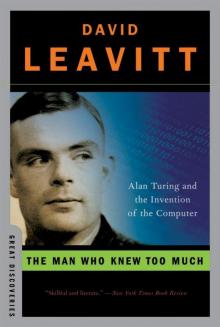 The Man Who Knew Too Much: Alan Turing and the Invention of the Computer (Great Discoveries)
The Man Who Knew Too Much: Alan Turing and the Invention of the Computer (Great Discoveries)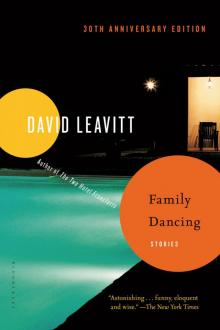 Family Dancing
Family Dancing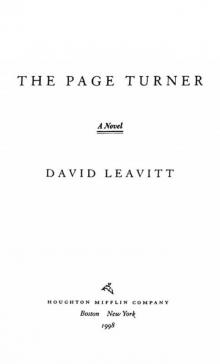 Page Turner Pa
Page Turner Pa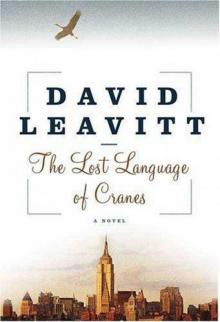 The Lost Language of Cranes: A Novel
The Lost Language of Cranes: A Novel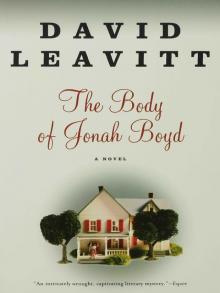 The Body of Jonah Boyd
The Body of Jonah Boyd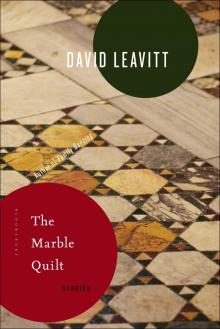 The Marble Quilt
The Marble Quilt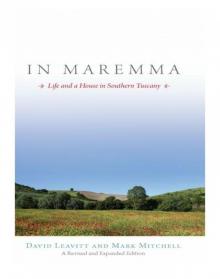 In Maremma
In Maremma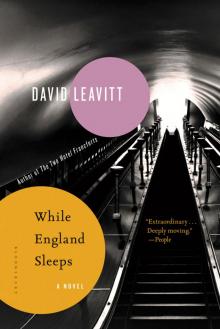 While England Sleeps
While England Sleeps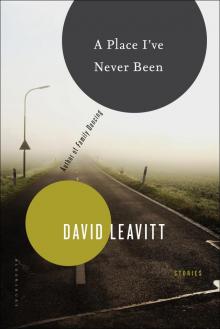 A Place I've Never Been
A Place I've Never Been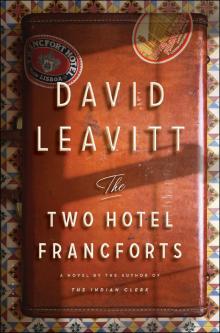 The Two Hotel Francforts
The Two Hotel Francforts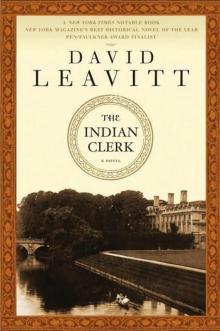 The Indian Clerk
The Indian Clerk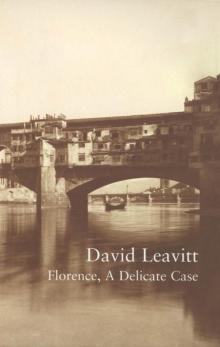 Florence
Florence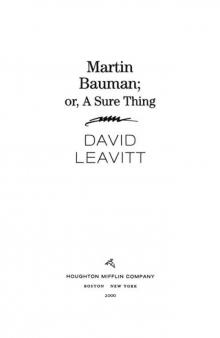 Martin Bauman
Martin Bauman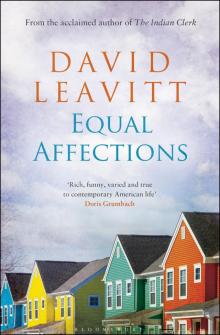 Equal Affections
Equal Affections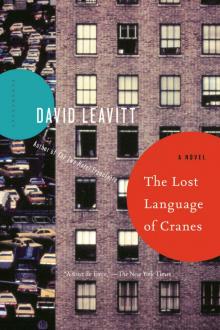 The Lost Language of Cranes
The Lost Language of Cranes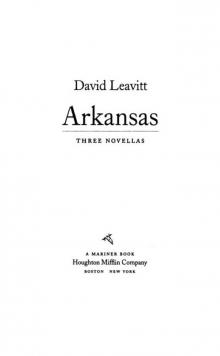 Arkansas
Arkansas